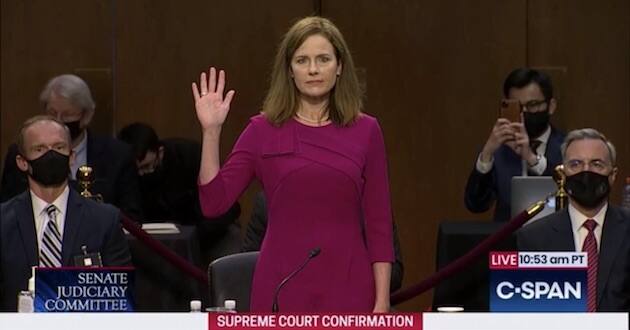Roe not a ‘super precedent’ that can’t be overturned, Coney Barrett says

The Roe v. Wade decision legalizing abortion is not a “super precedent” that’ can’t be overturned, Amy Coney Barrett said during Senate confirmation hearings.
Barrett made the comments to Democrat Sen. Amy Klobuchar during Senate confirmation hearings this week. Klobuchar asked Barrett if Brown v. Board of Education — the 1954 case that ruled school segregation was unconstitutional — was precedent that “could be overruled.” Klobuchar was referencing a 2013 article by Barrett in the “Texas Law Review” that distinguished between precedent and super precedent. Barrett called Brown a super precedent.
“People consider it to be on that very small list of things that are so widely established and agreed upon by everyone,” Barrett said. “Calls for its overruling simply don’t exist.”
Klobuchar then asked her if Roe v. Wade, which was handed down in 1973, is a super precedent. Barrett referenced her 2013 article, saying only about six Supreme Court cases can be called super precedent. Roe is not in that group, she said.
“People use super precedent differently,” she said. “The way that it’s used in the scholarship and the way that I was using it in the article that you’re reading from, was to define cases that are so well-settled, that no political actors and no people seriously push for their overruling. And I’m answering a lot of questions about Roe, which I think indicates that Roe doesn’t fall in that category
READ: This Supreme Court Justice says Roe wrongly decided
“And scholars across the spectrum say that doesn’t mean that Roe should be overruled. But descriptively, it does mean that it’s not a case that everyone has accepted and doesn’t call for its overruling.”
After further questioning from Klobuchar on the Roe issue, Barrett repeated her answer and referenced a quote from a Harvard professor.
“As [law professor] Richard Fallon from Harvard said, Roe is not a super precedent because calls for its overruling have never ceased,” Barrett said. “But that doesn’t mean that Roe should be overruled. It just means that it doesn’t fall on the small handful of cases like Marbury vs. Madison and Brown versus the Board that no one questions anymore.”
–Alan Goforth | Metro Voice






